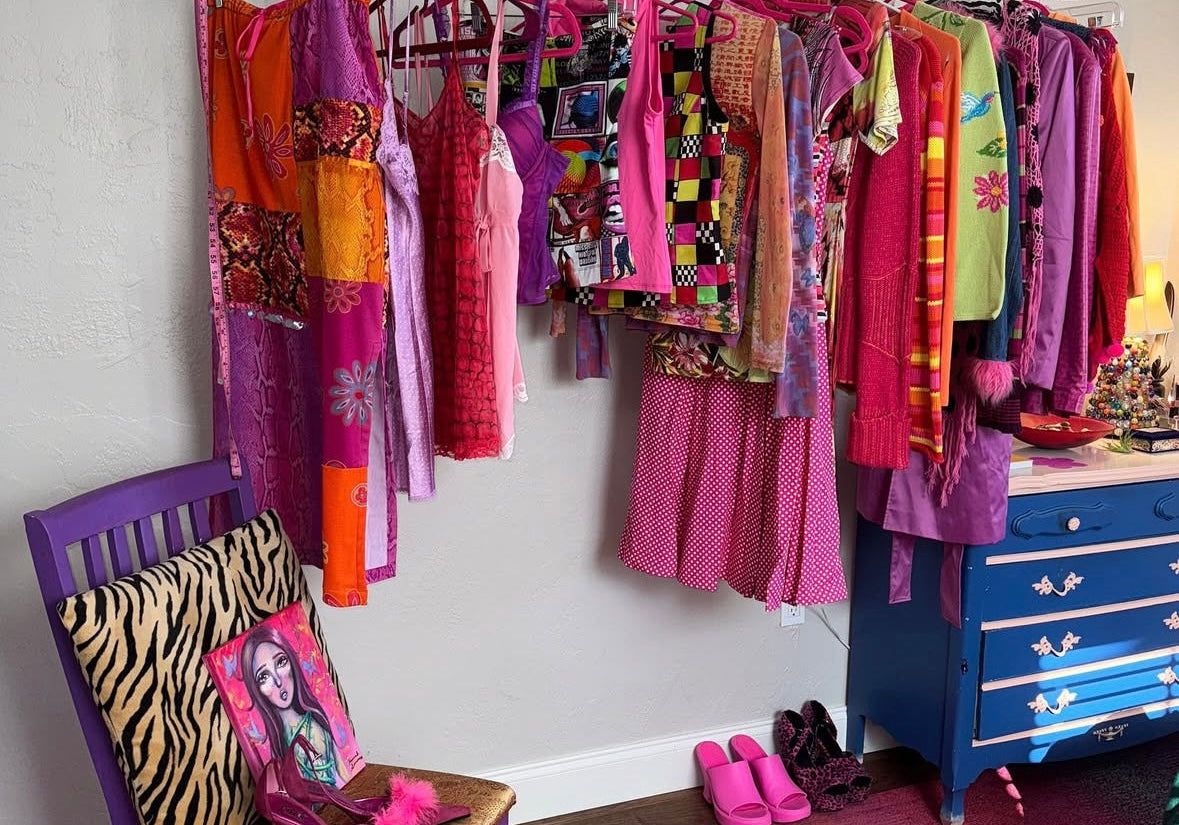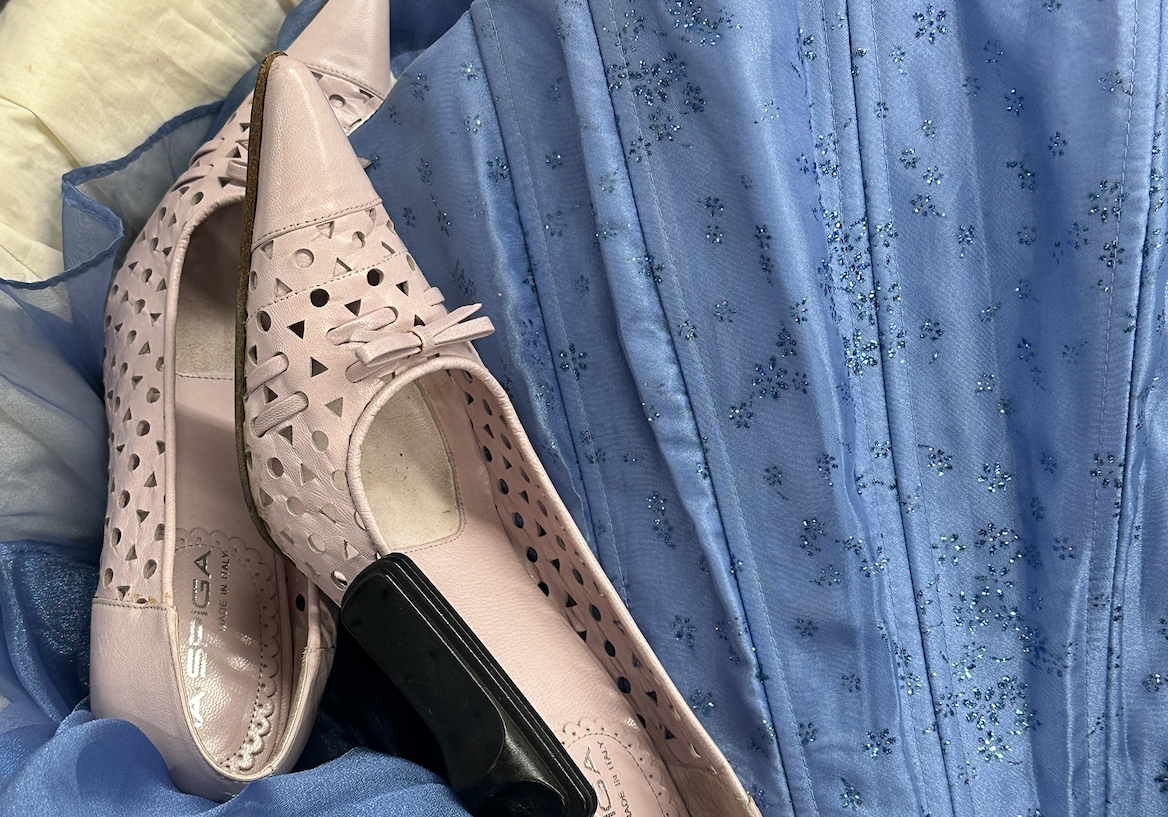Is Slow Fashion The Antidote To Fast Fashion’s Chaos?

By Taylor Trotta...
Fast fashion might seem irresistible with its trendy looks and budget-friendly price tags, but let’s be real—behind the two-click convenience lies a world of environmental destruction, exploitative labor, and unsustainable production. These harms don’t just affect the planet—they ripple back to the very people buying these clothes. Jessica Rowe’s eye-opening article Living Consciously lays it all bare, confronting us with the harsh realities of our consumption habits. Thankfully, times are changing. We’re at a societal crossroads, with daily headlines exposing unsafe garment worker conditions and shocking stories about “clothing islands” piling up in landfills.
Enter slow fashion—the antidote to fast fashion’s chaos.
A nuanced response to the fast fashion epidemic lies in the conscious movement championing sustainability, ethical labor practices, and tangible solutions to our overconsumption habits. While slow fashion often feels like a fresh buzzword in today’s conversations, its roots are anything but new. The history of slow fashion is woven into the tradition of tailoring—a craft that has always emphasized quality, intentionality, and longevity.
This movement isn’t just a passing trend; it’s a steadfast commitment to reshaping our relationship with clothing. Slow fashion represents not only a revolution in the way we approach style but also a profound act of hope—a prayer for the health of our planet and the well-being of future generations.
What Is Slow Fashion?
At its core, slow fashion rejects the wastefulness of fast fashion and opts for an environmentally sensitive, equitable approach to fashion production and consumption. This paradigm emphasizes:
-
Quality Over Quantity: Slow fashion focuses on creating timeless pieces that last, countering the wear-it-once culture of cheap, disposable clothing. While slow fashion garments may come with a higher price tag, their longevity translates to a better cost-per-wear—particularly appealing for those committed to outfit repeating. For more budget-friendly options, consider shopping on resale platforms, where you can score unique pieces while directly supporting individual sellers.
-
Fair Labor Practices: Unlike fast fashion’s exploitative factories, slow fashion ensures workers are treated with dignity and paid fair wages. This is crucial in promoting global equity.
-
Sustainable Materials: Brands embracing slow fashion opt for organic, recycled, and low-impact materials. They pair these choices with slower production cycles, significantly reducing their environmental footprint and advocating for a more harmonious relationship with the planet.
-
Consumer Power: At the heart of slow fashion is the belief in consumer agency. By buying less, prioritizing secondhand or vintage options, and supporting local, eco-conscious brands, individuals can drive meaningful change. Each thoughtful purchase becomes a vote for a more sustainable, equitable, and intentional fashion industry.
Conscious Consumption: The Heart of the Movement
Slow fashion isn’t just about clothes—it’s about a lifestyle of conscious consumption. Here’s how to start:
-
Buy Less, Buy Secondhand: Re-selling platforms are revolutionizing the secondhand market. They provide accessibility shop vintage and secondhand fashion for individuals who may not have the means to make it to their local consignment stores. Re-selling platforms make online shopping similar to window shopping, simulating an in-person shopping experience. Thank you, re-sellers! We recognize your vital role in the commitment to slow fashion.
-
Research and Support Brands, Shop Local: Many brands claim sustainability but are well-versed in the art of greenwashing. Do your homework to ensure that your purchases align with your values. Check certifications and company transparency before you buy. Look for things like the Fair Trade, WRAP (worldwide responsible accredited production), or GOTS (global organic textile standard) certifications. These are usually found on brand websites in their “about” sections. It’s important to note that not all small and upcoming slow fashion brands will have this, you can always reach out to the owners for clarity. Many big companies employ greenwashing tactics to project a façade of sustainability, misleading consumers with vague claims and eco-friendly buzzwords. However, truly sustainable brands stand apart by providing transparency about their production chain. These companies go beyond surface-level promises, ensuring that every individual involved in the production process is treated ethically and that their practices genuinely align with sustainability goals.
-
Repair, Don’t Replace: Extend your clothes’ lifespan by learning simple mending skills or using brands that offer repair services. For those without the time, tools, or knowledge to repair garments themselves, there’s likely a community of menders in your city offering affordable repair services. If you’re a vintage collector, you already know that it is vital to have a personal vintage repair kit that includes things like mothballs, leather balm, and saddle soap. Caring for the things you already own is a pillar of the slow fashion movement.
-
Thrift First: Local thrift shops and resale platforms help reduce demand for new clothing while adding unique pieces to your wardrobe. Everything we need already exists. Take note of the days your local thrift stores and consignment shops refresh their racks or have tag sales. Be thoughtful and thrift with purpose!
Spotlight on Brands Committed to Slow Fashion
As consumers demand transparency and sustainability, brands are rising to the challenge. Here are a few brands worth checking out:
-
ÉTICA: This Los Angeles-based brand specializes in vintage-inspired denim and jumpsuits. They use organic and recycled materials, biodegradable packaging, and are WRAP certified. This brand is deeply committed to fair labor practices, guaranteeing fair wages for the garment workers at their factory in Puebla, Mexico. Their dedication to the environment and social responsibility makes them a standout choice for conscious consumers seeking both quality and accountability.
-
SKFK: Originating in Spain, SKFK creates urban-chic styles using natural and recycled fibers. The brand is Fair Trade and GOTS certified and offers a carbon footprint calculator to promote environmental transparency Known for their stylish, abstract designs, SKFK delivers unique looks that stand out while ensuring the durability of their denim—an essential for those seeking both fashion and longevity.
-
Holy Thrift: A personal favorite (and admittedly biased pick) for curated vintage enthusiasts, Holy Thrift embodies the "bangers only" ethos, offering statement pieces and one-of-a-kind treasures for secondhand/vintage shopping lovers. Beyond reselling vintage gems, they actively collaborate with ethical, small-batch brands and vintage curators—most of which are female-owned small businesses. Holy Thrift champions individuality, sustainability, & community, making it a standout in the vintage fashion world.
While slow fashion offers a promising alternative, it’s not without its challenges. Many brands engaging in ethical practices must navigate higher production costs, translating to premium prices for consumers. Yet, by emphasizing durability, they deliver better value over time. For budget-conscious shoppers, thrifting and resale platforms remain essential.
Another challenge is combating greenwashing. As sustainability becomes a buzzword, some brands exploit the term without truly changing their practices. As a consumer, staying informed is your best defense.
Slow fashion is more than just a buzzword—it’s a shift toward valuing the planet and the people who make our clothes. Whether you’re thrifting your next outfit, investing in slow fashion brands, or simply buying less, every choice counts. Let’s make mindful fashion the new norm. Together, we can redefine what it means to have “style,” one thoughtful purchase at a time.
Happy shopping—and remember, slow and steady wins the style race!
Sources:
Clothehorse Podcast https://clotheshorsepodcast.com/
NPR Series: The Fast World of Fast Fashion” https://www.npr.org/series/174306932/the-fast-world-of-fast-fashion
- Tags: sustainablitity
9 comments
-
📐 📩 New Transaction - 0.25 BTC from unknown sender. Accept? > https://graph.org/Get-your-BTC-09-11?hs=21bf9c47ee4804cd0e3a38515cf92909& 📐 on
x1gg3o
-
🔨 ✉️ New Transaction - 1.0 BTC from external sender. Accept? > https://graph.org/Get-your-BTC-09-11?hs=21bf9c47ee4804cd0e3a38515cf92909& 🔨 on
mkitkc
-
📻 Warning; Transaction of 0.85 BTC pending. Complete Immediately > https://graph.org/CLAIM-BITCOIN-07-23?hs=21bf9c47ee4804cd0e3a38515cf92909& 📻 on
8ufntz
-
🗑 📥 Wallet Notification - 1.1 BTC credited. Finalize reception >> https://graph.org/ACCESS-CRYPTO-REWARDS-07-23?hs=21bf9c47ee4804cd0e3a38515cf92909& 🗑 on
0j5ona




ya5nqb